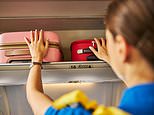
If it’s good enough for outer space, it’s good enough for the skies.
A flight attendant has revealed one product she always packs in her hand luggage when travelling – and it was once standard in NASA’s medical space kit.
Cabin crew member Emily, who has flown all over Asia and Europe over the last decade, explains that she does not go without Ponaris Nasal Emollient, a U.S-manufactured product that was taken along on every Apollo mission.
The flight attendant admits that she likes the product as it keeps her ‘nasal cavity lubricated’ at 38,000ft.
The ‘all-natural’ product is an ionised botanical oil blend containing pine, eucalyptus, peppermint, cajeput (a type of plant) and cottonseed and works to relieve stuffy, congested noses and nasal dryness, according to its website.
A flight attendant has revealed she always packs Ponaris Nasal Emollient in her hand luggage, a product that was once standard in NASA ‘s medical space kit (file picture)
‘All-natural’ product Ponaris Nasal Emollient is an ionised botanical oil blend containing pine, eucalyptus, peppermint, cajeput (a type of plant) and cottonseed and works to relieve stuffy, congested noses and nasal dryness
‘I don’t think it’s a miracle product to ward off colds the way that it was advertised, but it really keeps the inside of your nasal cavity lubricated, so I don’t feel like a dried-up corpse after long-haul flights,’ the flight attendant tells Yahoo.
The Ponaris Nasal Emollient website advises using one to two drops a couple of times a day for best effectiveness and warns not to give the product to young children or infants. It also says pregnant women should consult a doctor before use.
The product can be bought online and costs around £26 ($31) to purchase from Amazon.
Many passengers suffer from dry noses while flying due to the typically dryer cabin air. For those with sinus-related issues, changes in air pressure can cause pain or pressure while flying.
According to the Ohio Sinus Institute: ‘During take-off and landing, changes in the air pressure inside the plane’s cabin affects the air inside and outside of your head—which normally, should be balanced.
The flight attendant also notes that she tends to pack compression socks and a first aid kit while travelling
‘If your sinuses are congested, however, there will be an unbalanced amount of pressure. Not only can that be a very painful experience, but it can also increase nasal congestion, heighten allergies, worsen colds, and even trauma to the sinuses, if severe enough.’
While some have found the Ponaris Nasal Emollient to be effective in relieving these symptoms, the Ohio Sinus Institute outlines several other ways to manage them.
It suggests using a saline solution and decongestant spray before and after landing to counteract symptoms. Furthermore, it recommends that passengers get adequate rest and avoid caffeine and alcohol while flying.
If, however, these symptoms persist it advises travellers to ‘get checked out by a specialist and don’t put off treatment.’
Ponaris Nasal Emollient isn’t the only product that the flight attendant swears by – she tells Yahoo that she also travels with the Protect Life First Aid Kit which contains everything from bandages and gauzes to antiseptic towelettes and a CPR mask.
Other essentials, she says, include Bagail compression packing cubes for keeping everything packed neatly; FuelMeFoot compression socks to boost leg circulation and an Epicka universal travel adapter.
Share or comment on this article:
Flight attendant reveals she always packs this one NASA-approved item in her hand luggage – and astronauts have taken it on every Apollo mission
Source link
CHECK OUT: Top Travel Destinations
READ MORE: Travel News



